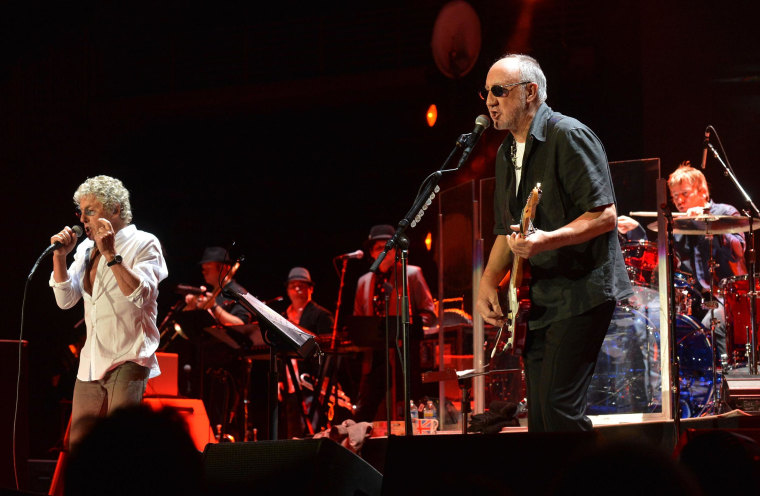It’s a rock adage that if the music’s too loud, you’re too old, but a new study finds that all that sound adds up: Professional musicians are almost four times more likely to suffer noise-induced hearing loss than other people.
That’s according to what’s likely the largest study to date of hearing disorders linked to people who pursue music as an occupation. German researchers who combed through health insurance records of 7 million people from 2004 to 2008 found that working musicians topped the charts for hearing loss.
The professionals were also about 57 percent more likely to suffer tinnitus — constant ringing in the ears — as a result of their jobs, according to scientists at the Leibniz Institute for Prevention Research and Epidemiology.
“Given the number of professional musicians and the severity of the outcome ... hearing loss in professional musicians is of high public health importance,” Dr. Wolfgang Ahrens and his colleagues concluded.
In the German study, of the 3 million people aged 19 to 66, more than 2,200 were professional musicians. Some 284,000 cases of hearing loss were logged, with 238 cases among musicians. Overall, the pros were 3.6 times more likely to suffer noise-induced deafness.
The data may be new, but the problem isn’t, according to experts and advocates who’ve warned about noise-induced hearing loss for years.
“We’ve known for decades now that noise-induced hearing loss, especially in rock concerts, predisposed a new generation to hearing loss.”
“I’m an old punk rocker. I’ve dedicated my life to it,” said Kathy Peck, executive director of HEAR — Hearing Education and Awareness for Rockers — who founded her group 30 years ago with help from Pete Townshend of The Who.
“When I started, no one believed it even existed.”
Townshend is one of several A-list rockers who has publicly discussed hearing loss and tinnitus. Others include Ozzy Osbourne, Neil Young and Phil Collins, who quit music in 2011 because of medical issues including losing hearing.
Hearing loss wasn’t regarded as a serious problem years ago, certainly not with the same priority as losing sight, said NBC’s Dr. Nancy Snyderman, an ear, nose and throat specialist. But it was happening just the same.
“We’ve known for decades now that noise-induced hearing loss, especially in rock concerts, predisposed a new generation to hearing loss,” said Snyderman, who wasn’t surprised at the latest findings.
Noise-induced hearing loss can be caused by sudden loud sounds, such as explosions or gunfire, but it can also be caused by repeated exposure to loud noise. Whether it’s orchestra players on stage or in the pit or rock musicians near loud speakers, professionals are constantly exposed to levels of sound loud enough to threaten or actually harm hearing.
Hearing loss starts with long or repeated exposures to sounds at or above 85 decibels, according to the National Institute on Deafness and Other Communication Disorders. Consider that a symphonic orchestra peaks at 120 decibels to 137 decibels and a full-throttle rock concert tops 150 decibels, and you can see the problem.
Loud sounds can damage microscopic hair cells, known as stereocilia, that line the ear. Those hair cells don’t grow back, so the loss is permanent, the NIDCD says. In many people, it leads to muffled or distorted sounds or the need to use hearing aids to amplify sound.
“I play saxophone, but I’m standing next to the drums and the cymbals are at ear level. Almost every musician I know has hearing loss, even if they won’t admit it.”
That’s certainly the case for Trevor Specht, 45, of Lutherville, Maryland, who has been a professional musician for 25 years, including the past 10 with Chopteeth, an Afro-funk big band. He was diagnosed with significant hearing loss a year ago and also has mild tinnitus.
“I play saxophone, but I’m standing next to the drums and the cymbals are at ear level,” he said. “Almost every musician I know has hearing loss, even if they won’t admit it.”
He wears musicians’ ear plugs now, devices that protect the ears from loud sounds while also allowing the wearers to hear clearly. But he didn’t wear them when he was younger and didn’t think about protecting his hearing.
“Now, over the course of a gig, it gets louder, until at the end of the night, oh, my ears feel really messed up,” he said.
Recent studies had suggested that musicians have better hearing, overall, than the general population and that their occupation actually increases sensitivity. But the German researchers said the risks posed by hearing loss far outweigh the benefits of enhanced hearing ability.
The German study authors also stress that the high incidence of hearing loss in musicians calls for preventive actions and internationally accepted standards. Musicians should be offered protective ear plugs, but also sound-protecting shields between the sections of an orchestra, they said.
For musicians, hearing loss is a particularly ironic problem, Specht said.
“It’s the primary tool of a musician,” he said. “No matter what kind of music you play or what kind of instrument you play, you need your ears.”
